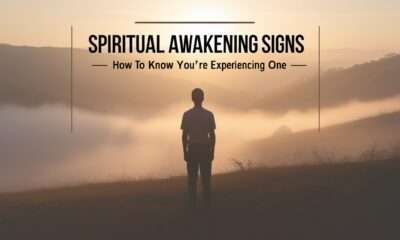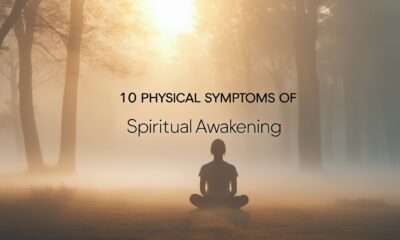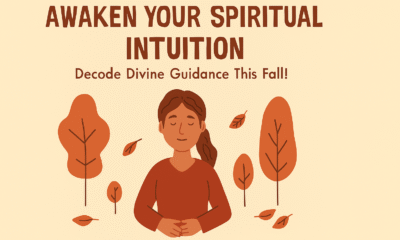Spirituality
Does the spiritual meaning of someone dying on your birthday hold significance?
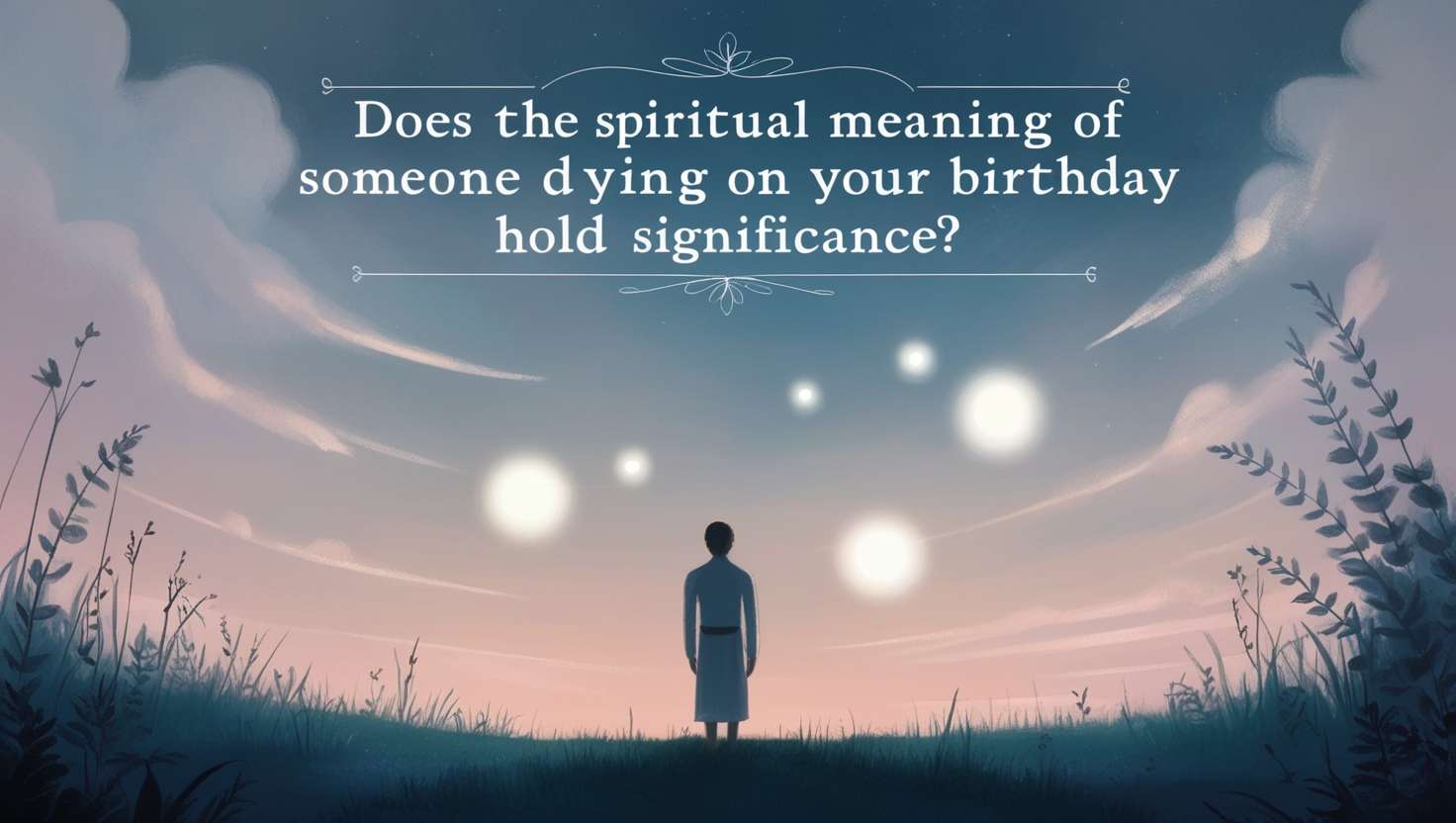
Have you ever experienced the passing of a loved one on your birthday and wondered if there was a deeper spiritual meaning behind it? Many people believe that the timing of someone’s death, especially on a significant date like a birthday, can hold special significance in the spiritual realm. In this article, we will explore the concept of the spiritual meaning of someone dying on your birthday and whether it holds any true significance in the world of spirituality and symbolism.
Table of Contents
Is it just a coincidence or is there a deeper meaning?
One of the first questions that may come to mind when someone passes away on your birthday is whether it is just a mere coincidence or if there is a deeper spiritual meaning behind it. Some people believe that certain events are orchestrated by the universe or a higher power, and that the timing of someone’s death on your birthday could be a sign from the spiritual realm.
Others may view it as pure chance and dismiss any spiritual significance attributed to the event. However, for those who are more attuned to spiritual beliefs and symbolism, the idea of someone passing on your birthday may hold a deeper, more profound meaning.

What could the spiritual meaning be?
There are various interpretations of the spiritual meaning behind someone dying on your birthday. Some believe that it could be a message from the universe or a deceased loved one, signaling a significant moment of transition or transformation in your life.
Others view it as a reminder to cherish the time we have on this earth and to live each day to the fullest, honoring the memory of the departed individual. It could also be seen as a moment of reflection and introspection, prompting us to reevaluate our priorities and make meaningful changes in our lives.
How can we find comfort and meaning in such a situation?
Coping with the loss of a loved one on your birthday can be a challenging and emotional experience. It is essential to find ways to seek comfort and meaning in such a situation. Some may find solace in spiritual practices such as meditation, prayer, or connecting with their higher self to find peace and understanding.
Others may turn to their support system of friends and family for love and emotional support during this difficult time. Finding healthy ways to process your grief and honor the memory of the departed individual can help bring a sense of closure and healing in the face of such a profound loss.
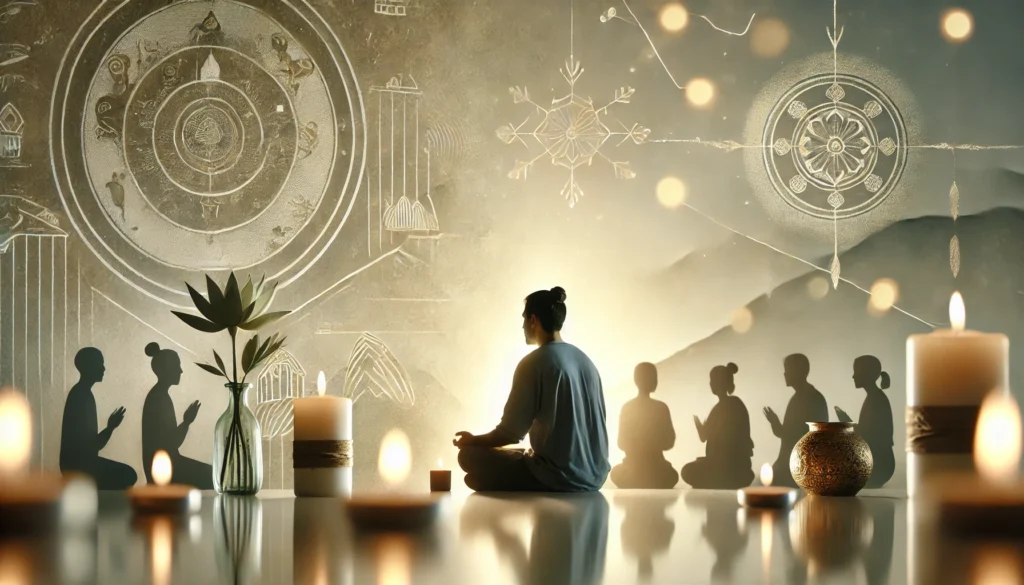
Does the timing of someone’s passing on your birthday affect your own beliefs or spirituality?
The timing of someone’s death on your birthday can evoke a range of emotions and thoughts about your own beliefs and spirituality. It may cause you to question the meaning of life, the existence of an afterlife, and the role of spirituality in your own journey.
Some may view it as a sign or message from the universe, reinforcing their faith and trust in spiritual concepts and the interconnectedness of all things. Others may struggle with feelings of anger, confusion, or doubt, leading them to reevaluate their beliefs and seek a deeper understanding of their own spirituality.
How can we honor the memory of the departed individual on our birthdays?
One way to honor the memory of someone who has passed away on your birthday is to create a special ritual or tradition in their honor. This could involve lighting a candle, saying a prayer, or dedicating a moment of silence to remember and reflect on their life and the impact they had on you.
You could also choose to celebrate their life by engaging in activities or practices that they enjoyed during their time on earth, such as cooking their favorite meal, listening to their favorite music, or visiting a place that held special meaning to them. By incorporating their presence into your birthday celebrations, you can keep their memory alive and honor the bond you shared with them.

Conclusion
In conclusion, the spiritual meaning of someone dying on your birthday can hold significance for those who are open to spiritual beliefs and symbolism. Whether it is viewed as a message from the universe, a moment of reflection, or a reminder to cherish life, the timing of someone’s passing on your birthday can evoke a range of emotions and thoughts about your own beliefs and spirituality.
By finding ways to seek comfort and meaning in such a situation, and by honoring the memory of the departed individual in special ways, you can navigate the complexities of grief and find peace and healing in the face of loss. Ultimately, the significance of such an event lies in how we choose to interpret and respond to it in our own spiritual journey.
What Does It Mean When Things Keep Falling? Exploring the Spiritual Symbolism
FAQs
1. Is it common for someone to pass away on their loved one’s birthday?
While it may not be a common occurrence, the timing of someone’s death on a loved one’s birthday can happen unexpectedly. The significance of such an event can vary depending on individual beliefs and interpretations.
2. How can I cope with the loss of a loved one on my birthday?
Coping with the loss of a loved one on your birthday can be challenging. It may be helpful to seek support from friends and family, engage in spiritual practices, and find healthy ways to honor the memory of the departed individual.
3. Is there a spiritual reason behind someone passing away on my birthday?
Some people believe that the timing of someone’s passing on your birthday could hold spiritual significance, such as a message from the universe or a deceased loved one. However, the interpretation of such events is subjective and varies from person to person.
4. How can I find meaning and comfort in the spiritual significance of someone’s passing on my birthday?
Finding meaning and comfort in the spiritual significance of someone’s passing on your birthday can involve engaging in spiritual practices, seeking support from others, and finding ways to honor the memory of the departed individual in special ways.
5. Does the spiritual significance of someone’s passing on my birthday affect my own beliefs or spirituality?
The spiritual significance of someone’s passing on your birthday can evoke a range of emotions and thoughts about your own beliefs and spirituality. It may lead you to question your beliefs, seek deeper understanding, or reinforce your faith in spiritual concepts.
Spirituality
Falling Dream Meaning – Why You See This During Stressful Times

Dreams have a way of sticking with you. You wake up, heart racing, with the vivid sensation of falling from a great height. It’s unsettling, and if it happens often, you might wonder what it means. Falling dream meanings are common, especially during stressful times. They’re not just random images your brain cooks up—they often carry meaning tied to what’s happening in your life. Let’s explore why these dreams show up, what they might be telling you, and how they connect to stress.
Table of Contents
What Are Falling Dream Meaning?
You’re in a dream, maybe walking along a cliff or standing in a tall building, and suddenly, you slip. The ground disappears, and you’re plummeting. Sometimes you jerk awake just before you hit the ground. Other times, the dream fades into something else. Either way, it feels real. Your body might even twitch as you wake, like you’re trying to catch yourself.
These dreams are universal. People across cultures and ages report them. They’re not always the same—some involve falling from the sky, others from a ladder or a rooftop—but the core feeling is consistent: a loss of control, a rush of fear, and that stomach-dropping sensation. So why do they happen? And why do they seem to pop up when life feels overwhelming?

The Connection to Stress
Stress is a big trigger for falling dreams. When life feels chaotic—work deadlines pile up, relationships strain, or you’re facing big changes—your brain processes that tension while you sleep. Dreams are your mind’s way of sorting through emotions, fears, and experiences. Falling dreams often reflect a sense of losing grip on something important.
Think about it. When you’re stressed, you might feel like you’re barely holding things together. Maybe you’re worried about failing at work, losing a relationship, or not meeting expectations. That fear of “falling” in real life—failing, losing control, or not being enough—can show up in your dreams as a literal fall. It’s your brain’s way of saying, “Hey, things feel shaky right now.”
For example, imagine you’re juggling a demanding job and family responsibilities. You’re exhausted, and you’re scared of dropping the ball. At night, your mind might turn that fear into a dream where you’re tumbling off a ledge. It’s not about the ledge itself—it’s about what it represents: the fear of not keeping up.
Common Themes in Falling Dreams
Not all falling dreams are the same. They often come with different details that hint at what’s going on in your life. Here are some common variations and what they might mean:
- Falling from a height, like a building or cliff. This often points to feeling overwhelmed by a big challenge. Maybe you’re facing a major decision or a situation that feels too big to handle.
- Tripping or slipping. These dreams might reflect smaller, everyday anxieties—like worrying about making a mistake at work or saying the wrong thing in a conversation.
- Falling endlessly. If you’re falling through the sky with no end in sight, it could mean you feel stuck in a situation with no clear resolution. It’s like your brain is saying, “I don’t know how to land this.”
- Waking up before you hit the ground. This is super common. It might be your body’s way of protecting you from the worst of the fear. Your brain snaps you awake to avoid the crash.
Each version of the dream ties back to a sense of instability. The details might change, but the core feeling is the same: you’re scared of losing control.
Why Your Body Reacts
You’ve probably noticed that falling dreams come with physical sensations. Your heart races, your stomach lurches, or you might even jerk awake. This happens because your brain doesn’t fully separate dreams from reality. When you dream of falling, your body reacts as if it’s actually happening. Your nervous system kicks into gear, sending signals that mimic a real fall.
This is tied to something called a hypnic jerk—a sudden muscle twitch that happens as you’re falling asleep. Scientists think it’s a leftover reflex from our ancestors, who slept in trees and needed to catch themselves if they slipped. In a falling dream, that reflex gets triggered, making the experience feel even more vivid.

Psychological Reasons Behind Falling Dreams
Falling dreams aren’t just about stress—they can point to deeper psychological patterns. Here are a few reasons why they might show up:
- Fear of failure. If you’re worried about not measuring up—at work, in relationships, or even with your own goals—that fear can manifest as a fall. It’s like your brain is visualizing what it feels like to “crash.”
- Loss of control. Life isn’t always predictable. When things feel out of your hands—like a job loss, a health issue, or an unstable relationship—your mind might process that by putting you in a free fall.
- Insecurity. If you’re doubting yourself or feeling unsteady in some area of your life, a falling dream can reflect that. It’s your subconscious saying, “I don’t feel grounded.”
- Big transitions. Starting a new job, moving to a new place, or going through a breakup can make you feel like you’re stepping into the unknown. Falling dreams often show up during these times of change.
For example, a friend of mine started having falling dreams when she was about to get married. She wasn’t scared of the marriage itself, but the idea of such a big life change made her feel unsteady. Her dreams were her brain’s way of working through that.
Cultural and Symbolic Meanings
Falling dreams have been interpreted in different ways across cultures and throughout history. In some traditions, they’re seen as spiritual messages. For instance:
- In ancient dream interpretation. Some cultures believed falling dreams were a warning to stay grounded or avoid taking risks. They saw the fall as a sign you were straying from your path.
- In modern psychology. Experts like Carl Jung thought falling dreams symbolized a need to reconnect with your “grounded” self. Jung believed dreams were a way for your unconscious to communicate deeper truths.
- In spiritual practices. Some spiritual traditions see falling dreams as a sign of letting go—releasing old fears or attachments to move forward.
These interpretations aren’t hard rules, but they show how universal falling dreams are. No matter where you’re from, the image of falling carries weight.
What Falling Dreams Aren’t
It’s worth mentioning what falling dreams don’t mean. They’re not a literal prediction of the future—no, you’re not going to fall off a building tomorrow. They’re also not a sign of something wrong with your brain. They’re a normal part of how your mind processes emotions, especially during tough times.
Some people worry that recurring falling dreams mean they’re “broken” or that something bad is coming. That’s not true. They’re just your brain’s way of dealing with stress or uncertainty. It’s like a pressure valve, letting out some of the tension you’re carrying.

How to Deal with Falling Dreams
If falling dreams are keeping you up or making you anxious, there are ways to manage them. Here are some practical steps:
- Address your stress. Since stress is a big trigger, look at what’s overwhelming you. Can you break tasks into smaller pieces? Can you talk to someone about what’s on your mind? Even small steps, like taking a walk or journaling, can help.
- Create a bedtime routine. A calm mind is less likely to churn out intense dreams. Try winding down with something relaxing, like reading or listening to soft music. Avoid screens an hour before bed—they can keep your brain wired.
- Reflect on the dream. When you wake up, think about what the fall might represent. Are you scared of failing at something? Feeling out of control? Writing down your thoughts can help you spot patterns.
- Practice grounding techniques. If you’re feeling unsteady in life, try mindfulness or meditation. These can help you feel more centered, which might reduce falling dreams over time.
- Talk to someone. If the dreams are frequent and upsetting, a therapist or counselor can help you dig into what’s behind them. Sometimes, talking it out makes a big difference.
For example, I had a period where falling dreams kept happening during a tough work project. I started journaling about what was stressing me out, and over time, the dreams faded. It wasn’t instant, but it helped.
When to Seek Help
Falling dreams are usually harmless, but if they’re happening every night or leaving you exhausted, it might be worth looking deeper. They could be tied to anxiety, depression, or even sleep issues like insomnia. If you’re also feeling overwhelmed during the day, or if the dreams come with other intense nightmares, talking to a doctor or therapist can help.
They might suggest things like cognitive behavioral therapy (CBT), which can help you manage stress and change how your brain processes fear. In rare cases, frequent vivid dreams could point to a sleep disorder, so a sleep study might be recommended.
Can You Prevent Falling Dreams?
You can’t always stop falling dreams, but you can lower the chances of having them. Here’s how:
- Get enough sleep. When you’re sleep-deprived, your brain is more likely to churn out intense dreams. Aim for 7-8 hours a night.
- Manage stress during the day. Exercise, talk to a friend, or do something you enjoy. The less stress you carry to bed, the calmer your dreams might be.
- Avoid heavy meals or alcohol before bed. These can mess with your sleep cycle and make dreams more vivid.
- Create a safe sleep environment. A comfortable bed, dark room, and cool temperature can help you sleep more soundly, which might reduce intense dreams.
What If You Enjoy Falling Dreams?
Not everyone hates falling dreams. Some people find them thrilling, like a rollercoaster ride. If that’s you, there’s no need to “fix” them. They might just be your brain’s way of processing excitement or a desire for adventure. In that case, enjoy the ride! But if they start feeling unsettling or too frequent, the tips above can still help.

A Personal Take
I’ve had falling dreams during some of the most stressful times in my life—moving to a new city, starting a new job, or navigating a breakup. Each time, the dreams felt like a signal that I was carrying too much worry. They weren’t fun, but they pushed me to slow down and figure out what was really bothering me. In a way, they were like a wake-up call—not to scare me, but to get me to pay attention.
Wrapping Up
Falling dreams are more than just random images. They’re your brain’s way of processing stress, fear, or uncertainty. Whether you’re falling from a skyscraper or tripping over a curb, the message is often the same: something in your life feels unsteady. By paying attention to what’s going on when you’re awake, you can start to make sense of these dreams and maybe even reduce them.
Next time you wake up from a falling dream, don’t brush it off. Think about what’s been weighing on you. Are you scared of failing? Feeling out of control? Write it down, talk it out, or take a small step to ease the stress. Your dreams are trying to tell you something—listen.
Spiritual Awakening Signs: How to Know You’re Experiencing One
Spirituality
Spiritual Awakening Signs: How to Know You’re Experiencing One
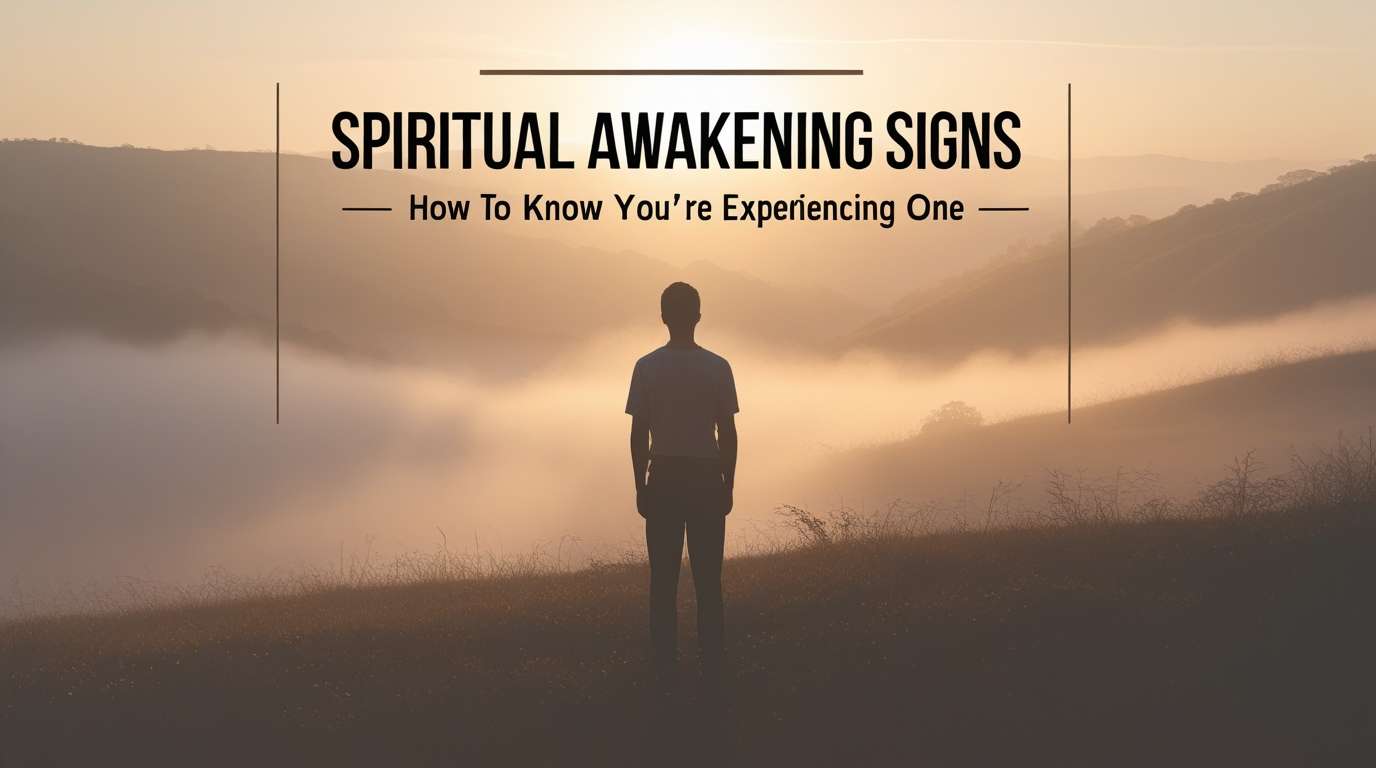
Most people expect spiritual awakening signs to feel like bliss. But truthfully, it’s often messy before it’s peaceful. It can come during heartbreak, burnout, or even an ordinary afternoon when something inside you quietly shifts. You start seeing through old patterns. You feel drawn to something deeper, though you can’t quite name it.
Awakening isn’t about escaping your life—it’s about waking up inside it. It changes how you think, what you value, and how you move through the world. Below, we’ll look at the real signs of awakening—what they feel like, why they happen, and how to navigate them with honesty and care.
Table of Contents
1. 1st of Spiritual Awakening Signs is Your values start to change
You may notice that what used to drive you—status, approval, routine—starts to lose its grip. You care less about pleasing people and more about living in a way that feels true.
This can bring confusion. You might question your job, relationships, or the path you’ve been on for years. That questioning isn’t failure; it’s the beginning of awareness.
What matters now is different: peace instead of praise, purpose instead of performance.
It’s not always comfortable, but it’s real.

2. You become aware of your thoughts
Before awakening, thoughts run the show. After, you begin to see them. You catch the inner voice that says, “I can’t,” or “I’m not enough.”
You realize those thoughts aren’t truth—they’re habits.
That simple awareness changes everything. You pause more. You speak less out of impulse. You recognize that behind the noise, you’re actually calm.
It’s not that negative thoughts disappear. You just stop believing every one of them.
3. Emotions come up stronger
Awakening often stirs emotion like a storm stirring the sea. You might cry for no clear reason or feel anger that surprises you.
What’s happening is release. Emotions you’ve carried for years are finding a way out. It can feel messy, but it’s cleansing.
When you feel waves rise, let them. Cry if you need to. Write if it helps. Move your body. Then rest.
Healing looks chaotic when it’s working.
4. Your relationships start to shift
When you change, your relationships change too. Some grow deeper, others drift away. You might feel lonely for a while.
You start craving honesty over harmony. You stop pretending just to keep the peace. You’d rather have silence than small talk.
This doesn’t mean you’ve become cold. It means you’re done faking connection. The people meant to stay will meet you at that level of truth.

5. You crave quiet and simplicity
Suddenly, loud environments feel exhausting. You seek quiet mornings, slower days, fewer distractions.
This isn’t laziness—it’s integration. Your system needs space to process new awareness.
You might clean your home, cancel plans, or spend more time alone. That’s not isolation. It’s grounding.
Solitude can be medicine when you’re learning who you really are.
6. Your body speaks louder
Awakening doesn’t just happen in your mind. The body joins in. You may notice tension, tingling, warmth, or fatigue that comes and goes.
Sometimes your sleep changes. Sometimes your appetite does. It’s your nervous system adjusting to a new level of awareness.
Still, listen to your body carefully. If symptoms are strong or worrisome, see a doctor. Spiritual growth and physical care go hand in hand.
Drink water. Rest when you can. Eat real food. Your body is the ground your spirit stands on.
7. You start simplifying your life
You no longer want excess. You declutter your space, cut down on noise, and stop forcing what feels wrong.
Simplicity becomes natural, not trendy.
You may start saying “no” more. You may leave certain groups or habits behind. You don’t need as much to feel full.
Awakening replaces consumption with clarity.
8. Your intuition gets stronger
Something inside you starts guiding decisions. It’s quiet, but clear. You just “know” things you can’t explain.
You might feel drawn to new places or people without logical reason. Or you feel uneasy before something proves untrue.
Intuition isn’t magic—it’s awareness tuned inward. The more you trust it, the sharper it gets.
It’s your inner compass, built on honesty and presence.
9. You see patterns more clearly
You start recognizing how your choices repeat. The same kind of argument, the same kind of heartbreak—it’s all teaching you something.
Instead of asking, “Why does this keep happening to me?” you start asking, “What am I learning this time?”
This shift is quiet but powerful. You stop blaming. You start adjusting.
Awakening doesn’t erase struggle. It helps you see its purpose.

10. You feel more connected to everything
A calm sense of belonging grows. Not because life is perfect, but because you see yourself as part of it all.
You notice small details—the way light falls on a wall, the sound of rain, the kindness of a stranger—and they move you.
You feel gratitude without reason. And when pain comes, you meet it with understanding instead of panic.
That’s what real awakening looks like—not floating above life, but living deeply within it.
What awakening is not
It’s not constant happiness. You’ll still get tired, angry, or scared.
It’s not superiority. Awakening doesn’t make you better than others—it makes you more human.
It’s not detachment. You don’t disappear from life; you engage with it more honestly.
And it’s not about leaving your responsibilities behind. You still show up for work, pay bills, and keep your commitments. Only now, you do it with awareness instead of autopilot.
How to stay grounded through it
Awakening can feel intense. Grounding yourself keeps it manageable.
- Move your body. Walk, stretch, breathe deeply. Physical motion helps energy settle.
- Eat and hydrate. Keep meals simple and regular. A nourished body can handle emotional shifts better.
- Spend time outside. Sunlight, trees, or open air help regulate your nervous system.
- Write daily. Let thoughts spill out without judgment. It clears mental clutter.
- Talk to someone. A friend, counselor, or mentor can offer perspective when you’re overwhelmed.
- Limit input. Step back from social media or overstimulation. Your mind needs rest too.
Small, steady routines make big changes easier to live with.
How to tell if it’s awakening or something else
Ask yourself a few honest questions:
- Is this leading me toward kindness or away from it?
- Am I becoming more present, even in discomfort?
- Does this change make me more compassionate with myself and others?
If the answer is yes, you’re probably growing in awareness.
But if you feel detached from reality, can’t function day-to-day, or feel constant fear, it might be something else—and that’s okay. Growth and healing can look similar to stress or trauma recovery. Both deserve support.
Spiritual awakening doesn’t mean doing it alone.

When things feel heavy
There will be days when clarity fades and confusion returns. You’ll doubt the process, wish for your old life, or question if you’re “doing it right.”
That’s normal.
When it happens, slow down. Focus on one small act of care: drink water, breathe, step outside.
Awakening isn’t measured by progress—it’s measured by presence.
You can’t fail it. You can only resist or allow it.
Signs you’re integrating the change
After the intensity settles, things start to feel lighter. You notice differences in subtle ways:
- You pause before reacting.
- You forgive faster.
- You make choices that match your values.
- You don’t need constant noise to feel okay.
- You handle uncertainty with more calm than before.
You’re not done (no one ever is), but you’re more balanced. You’ve learned to live awake.
A grounded truth
Spiritual awakening isn’t about becoming special—it’s about becoming honest.
You stop chasing meaning and start living it.
You learn that awareness isn’t always pleasant, but it’s freeing.
You realize peace isn’t somewhere else—it’s what’s left when the noise fades.
So if you’re feeling the signs, don’t panic. Don’t label it too fast. Just stay close to what’s real: your breath, your body, your present moment.
Awakening isn’t about reaching the light. It’s about learning to see it—right where you are.
10 Physical Symptoms of Spiritual Awakening — What They Mean and How to Handle Them
Spirituality
10 Physical Symptoms of Spiritual Awakening — What They Mean and How to Handle Them
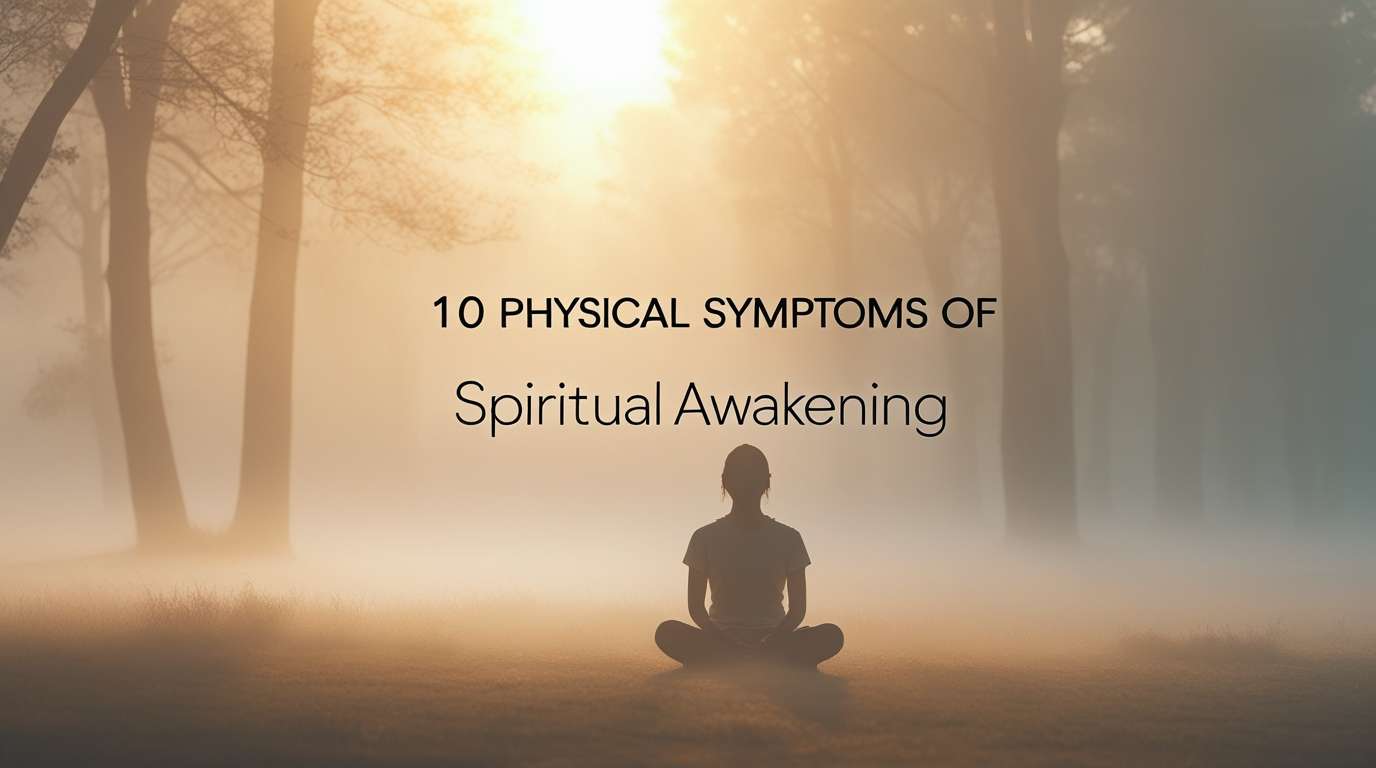
Let’s see 10 Physical Symptoms of Spiritual Awakening you must aware. Spiritual awakening isn’t as dreamy as it sounds. It’s not all peace and light. For many, it feels like being cracked open from the inside. Your thoughts shift, your emotions come up fast, and your body—sometimes without warning—joins the process.
This isn’t a medical guide. It’s a human one. If you ever feel unwell or unsure, talk to a doctor. Awakening or not, your health matters.
Below are ten physical changes people often notice during a spiritual awakening. They can be mild or intense, steady or unpredictable. The point is to understand what might be happening, not to romanticize it.
Table of Contents
1. Changes in Sleep
Sleep tends to shift first. Some people start waking up around 3 or 4 a.m. for no clear reason. Others sleep deeply but still feel tired.
Your body’s rhythm is adjusting. You might process emotions or insights in your dreams. Or your mind may just need space to quiet down.
If this happens, don’t fight it. Try to rest when you can. Avoid screens late at night. Keep your space dim and quiet. A short nap in the afternoon can help balance the fatigue.
And if insomnia becomes constant, it’s worth checking with a professional. Not every restless night is spiritual—sometimes it’s just stress, hormones, or caffeine.

2. Sudden Bursts and Drops in Energy
You might feel unstoppable one day, then wiped out the next. That’s common.
When your awareness expands, your body uses energy in new ways. Old emotional patterns take effort to release. You may find yourself drained after social events or large crowds.
It helps to slow down. Drink water. Eat something grounding—like rice, oats, or root vegetables. Let your body catch up with your mind.
This phase passes, but rest is part of the process. Growth doesn’t always look productive.
3. Aches, Stiffness, or Body Tension
The body keeps score, as the saying goes. During awakening, memories and emotions that were buried can rise to the surface. That tension often lands in the neck, shoulders, or back.
It’s not punishment. It’s release.
Gentle movement helps—stretching, yoga, walking. So does warm water or a massage if you can get one. Avoid pushing through pain. Your body is trying to communicate, not compete.
Sometimes it’s surprising how emotional physical pain can feel. Let tears come if they do. That’s healing too.
4. Head Pressure or Strange Sensations Around the Crown
Some describe a light pressure at the top of the head or a tingling near the temples. Others call it a “buzz” or a pulsing between the brows.
There’s no clear medical explanation for this. It might be a side effect of stress or heightened focus. Spiritually, many link it to energy centers opening up.
Either way, grounding helps. Go outside, touch the earth, or sit quietly with slow breaths. If headaches become painful or constant, again—see a doctor. Spiritual growth shouldn’t come with suffering you have to endure.

5. Tingling, Vibrations, or Electrical Feelings
It can feel like your body is humming. Some people feel it in the hands or feet. Others in their spine. It’s often subtle, but it can be surprising.
This is sometimes called “kundalini energy,” though the term isn’t necessary to describe what’s happening. Think of it as your nervous system becoming more awake, more responsive.
Don’t force it or try to make it stronger. Just notice it. Drink plenty of water, move gently, and let it balance itself out.
The body knows how to regulate energy. You don’t have to manage it like a project.
6. Digestive Upsets
The gut is sensitive to emotion. It reacts to everything—stress, joy, fear, excitement. During awakening, when feelings come up fast, your stomach often speaks first.
You might notice bloating, appetite swings, or food cravings. Sometimes you can’t tolerate what you used to love.
Eat simple foods. Listen to your digestion instead of forcing it. Avoid heavy or processed meals for a while if they feel hard to handle.
If symptoms persist or get severe, check in with a medical professional. Spiritual explanations shouldn’t replace physical care.
7. Heart Sensations and Chest Flutters
You may feel warmth in your chest, a skip in your heartbeat, or even pressure that feels emotional more than physical. The heart area is often where we hold love, grief, and longing—all of which get stirred up during awakening.
If it’s mild and comes with emotion, rest and breathe through it. Place your hand over your chest and focus on steady breathing.
But if the feeling is painful or causes worry, seek medical help right away. Heart symptoms can be serious. You can’t grow spiritually if your body is neglected.
8. Sensitivity to Light, Sound, or Crowds
When you become more aware, your senses sharpen too. Bright lights may feel too sharp. Noisy places may overwhelm you. Even conversations can feel “louder” emotionally.
You might need more quiet time. That’s okay. Spend time in nature, or in spaces that feel calm. Limit exposure to news or social media for a while.
Your nervous system is adjusting. Give it space to reset.
Being sensitive doesn’t mean you’re weak. It means you’re tuned in.
9. Temperature Shifts
Sudden warmth, chills, or night sweats are common. Sometimes you’ll feel heat move through your body without reason.
These changes often show up during emotional release. It’s like your body recalibrating.
Dress in layers. Keep cool water nearby. Let the sensations pass without labeling them as good or bad. They don’t last forever.

10. Vivid Dreams and Emotional Mornings
Dreams can get intense—almost cinematic. You might dream of people from your past, symbolic places, or emotions that feel too real.
It’s your subconscious sorting things out. Your mind is reorganizing what you’ve experienced.
When you wake up, write a few notes about what you remember. Not to analyze it, but to track patterns. Over time, you’ll see what’s shifting.
You may also wake up feeling raw or emotional. Give yourself a gentle start—slow music, warm tea, sunlight. Don’t rush into the day if you can help it.
The Deeper Meaning Behind the 10 Physical Symptoms of Spiritual Awakening
Spiritual awakening isn’t about escaping the body. It’s about coming back into it. For a long time, many of us live half-disconnected—thinking more than feeling, pushing through instead of pausing. Awakening flips that pattern.
The symptoms aren’t random. They’re your body’s way of realigning. It’s like cleaning out a closet—you stir up dust before it looks clear again.
You may also notice emotional echoes tied to these changes. Old anger might surface as stomach tension. Sadness may show up in the chest. Fear might feel like tight shoulders or shaky legs.
The trick isn’t to chase these sensations away. It’s to meet them. Notice them without panic. Ask what they’re showing you. Then let them go.
How to Support Yourself Through It
This process can feel strange, but it doesn’t have to be dramatic. Most of the time, simple care is enough.
1. Stay hydrated.
Water helps your body process everything. It sounds basic, but it matters.
2. Rest without guilt.
If you’re tired, sleep. The world won’t fall apart because you took a nap.
3. Eat grounding foods.
Think simple meals—vegetables, grains, soups. Avoid too much sugar or caffeine if you’re jittery.
4. Move gently.
Walk, stretch, or dance. Let energy flow instead of sitting stagnant.
5. Spend time in nature.
Trees, fresh air, water—all help settle your system. Even five minutes helps.
6. Write things down.
Journaling helps your mind process what your body feels.
7. Talk to someone you trust.
A friend, therapist, or spiritual teacher. You don’t have to figure it out alone.
8. Don’t rush the process.
Awakening isn’t a race. You don’t get a medal for finishing fast.

What It Isn’t
Not every ache or mood change is spiritual. Sometimes it’s just life. It’s important to stay grounded and realistic. If you’re in pain, see a doctor. If you feel anxious or depressed, talk to a counselor.
Spiritual growth and medical care can exist together. One doesn’t cancel the other.
And remember: awakening isn’t about being perfect or always peaceful. It’s about seeing things more clearly, even the messy parts. You may not feel “enlightened.” You might just feel real. That’s enough.
A Gentle Reminder
If you’re reading this because your body feels strange, take a deep breath. You’re not broken. You’re changing.
Some days you’ll feel lighter. Other days you’ll wish it would all stop. Both are normal.
When things get hard, come back to the basics: water, rest, food, air, and kindness. Not the grand kind—the quiet kind.
Awakening isn’t about leaving the human experience behind. It’s about stepping fully into it—with awareness, honesty, and care.
Your body isn’t betraying you. It’s guiding you. Listen to it. Respect it. And let it lead you home.
Snake in Dreams: Spiritual Meaning and Ancient Symbolism Explained
-

 Spirituality1 year ago
Spirituality1 year agoWhat does a three-legged dog symbolize spiritually?
-

 Spirituality1 year ago
Spirituality1 year agoWhat is the spiritual significance of limes?
-

 Spirituality1 year ago
Spirituality1 year agoWhat is the Spiritual Significance of the Sun and Moon?
-

 Spirituality1 year ago
Spirituality1 year agoWhat Does a Paper Cut Mean Spiritually?
-

 Spirituality1 year ago
Spirituality1 year agoWhat is the spiritual significance of white eyes?
-

 Symbolism1 year ago
Symbolism1 year agoWhat is the spiritual significance of the white dragon?
-

 Dream Meanings1 year ago
Dream Meanings1 year agoHave You Ever Wondered About the Spiritual Significance of Finding a Lost Item?
-

 Symbolism1 year ago
Symbolism1 year agoWhat Does a Green Moon Symbolize in Spirituality?









